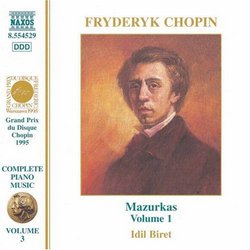| All Artists: Frederic Chopin, Idil Biret Title: Chopin: Complete Piano Music, Vol. 3 Members Wishing: 1 Total Copies: 0 Label: Naxos Original Release Date: 1/1/1999 Re-Release Date: 9/28/1999 Genre: Classical Styles: Chamber Music, Historical Periods, Classical (c.1770-1830) Number of Discs: 1 SwapaCD Credits: 1 UPC: 636943452929 |
Search - Frederic Chopin, Idil Biret :: Chopin: Complete Piano Music, Vol. 3
 | Frederic Chopin, Idil Biret Chopin: Complete Piano Music, Vol. 3 Genre: Classical
|
Larger Image |
CD Details |
CD ReviewsIdel Biret Plays the Chopin Mazurkas -- 1 Robin Friedman | Washington, D.C. United States | 01/22/2008 (5 out of 5 stars) "The mazurka is a distinctively rhythmical Polish dance in 3/4 time that, as did another dance, the polonaise, moved from the rural areas of Poland to the ballrooms of the aristocracy. Listeners wanting to hear a polonaise and mazurka combined in one work should explore Chopin's polonaise in F sharp minor, opus 44, which includes a mazurka as its middle section.
The polonaise form had been adopted by other composers before Chopin, but Chopin was the first composer to write mazurkas. Chopin composed over 50 mazurkas. The mazurkas are minatures, some of them less than one minute in length, that include inexhaustible musical subtlety, singing melodies, unusual harmonies and modalities, counterpoint, and a range of feeling and emotion. Most of the mazurkas are variations of a form which includes an opening group of themes, a middle section, and then a return of the opening material. The mazurkas have been recorded many times. For those wanting to get to know Chopin, and beautiful pianism, this budget-priced and award winning performance by the Turkish pianist Idel Biret is an excellent place to start. Biret recorded the complete piano works of Chopin for Naxos. She plays with a restrained, lyrical, and rhythmically fluid style that encourage the listener's attention to the music rather than to the performer. Biret's recordings of the mazurkas, chronologically arranged, are available on two separate CDs. This CD includes the first 26 mazurkas from the four early works of opus 6 to the initial mazurka of opus 41. These small works each have a character of their own. Probably the best-known of the mazurkas is the early mazurka in b flat major, opus 7 no. 1, with its halting opening theme and graceful second theme. This famous work serves as an excellent entry to the world of the Chopin mazurka. Chopin composed his mazurkas in small sets, and it is worthwhile to take a look at one of these sets for the variety they include. The mazurka in B flat major, op 17 no 1 oepns with a singing, joyful theme followed by a contrasting, quiet middle section. The second of the set is in e minor and is melancholy and delicate. Opus 17 no. 3 in A flat major is also meditative and quiet with light and flighty material interspersed.(Compare Chopin's graceful use of a flat major here with that of his "heroic" polonaise, opus 53.) The final work of the set is in a minor and features a plaintive theme with much variation in its harmony over repeated chords. In at least two of the mazurkas on this CD, Chopin makes great use of unusual modal harmonies. The mazurka in C major, opus 24 no. 2 shifts between song-like and march-like material. It is written in the Lydian mode -- which can be found by playing the white keys on the piano beginning with F. The mazurka in C sharp minor, opus 41 no. 1 also contrasts quiet and brilliant passages. It makes use of the Phyrigian mode which consists of an interval of only a half-step between the first in second notes of the scale (any white key and its immediately adjacent black key on the piano.) In addition to the works mentioned above, the mazurka in b minor opus 30 no. 2 has a haunting theme over an oom-pah-pah bass. Opus 30 no. 3 begins with a single repeated note which soon breaks into song and which shifts in a Schubertian way between major and minor keys. The mazurka in D major, opus 33 no 2 is simple, strongly rhythmical, and lively. Every listener will develop favorites among the works in this collection and its companion volume with repeated hearings. New lovers of the piano and of Chopin will especially enjoy these performances of the mazurkas by Idel Biret. Robin Friedman" |

 Track Listings (26) - Disc #1
Track Listings (26) - Disc #1